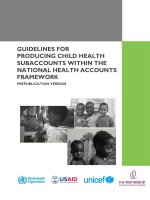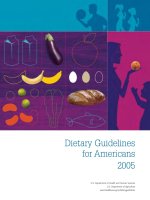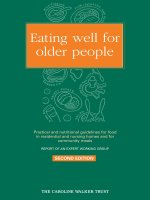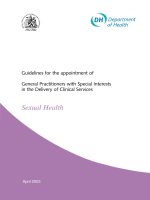Referral guidelines for suspected cancer potx
Bạn đang xem bản rút gọn của tài liệu. Xem và tải ngay bản đầy đủ của tài liệu tại đây (257.4 KB, 56 trang )
Information about NICE Clinical Guideline 27
Issue date: June 2005
Referral guidelines for
suspected cancer
Understanding NICE guidance –
information for people with suspected
cancer, their families and carers,
and the public
Referral guidelines for suspected cancer
Ordering information
National Institute for
Health and Clinical Excellence
MidCity Place
71 High Holbor
n
London
WC1V 6NA
www.nice.org.uk
ISBN 1-84629-055-4
© National Institute for Health and
Clinical Excellence, June 2005.
All rights reserved. This material may be
freely reproduced for educational and
not-for-profit purposes within the NHS.
No reproduction by or for commercial
organisations is allowed without the
express written permission of the National
Institute for Health and Clinical Excellence.
Ordering information
You can download the following documents from www.nice.org.uk/CG027
●
This booklet.
●
The NICE guideline – all the recommendations on referral guidelines for
suspected cancer.
●
A quick reference guide, which has been distributed to health professionals
working in the NHS in England.
●
The full guideline – all the recommendations, details of how they were
developed, and summaries of the evidence on which they were based.
For printed copies of the quick reference guide or information for the public,
phone the NHS Response Line on 0870 1555 455 and quote:
●
N0851 (quick reference guide)
●
N0852 (information for the public)
Referral guidelines for suspected cancer
Contents
Information about NICE Clinical Guideline 27
3
Contents
About this information 4
Cancer referral and your information needs 6
Adult cancer 12
Lung cancer 12
Upper gastrointestinal cancer 15
Lower gastrointestinal cancer 18
Breast cancer 20
Gynaecological cancer 23
Urological cancer 25
Haematological cancer 29
Skin cancer 32
Head and neck cancer including thyroid cancer 34
Brain and central nervous system cancer 37
Bone cancer and sarcoma 40
Cancer in children and young people 42
Where you can find more information 54
Referral guidelines for suspected cancer
About this information
Information about NICE Clinical Guideline 27
4
About this information
This booklet provides a simple guide to the clinical guideline that
the National Institute for Health and Clinical Excellence (NICE) issued
to the NHS in England and Wales on referral for suspected cancer.
This guideline is an update of a guideline published by the
Department of Health in 2000. The recommendations made here
take account of new research and override those made previously.
Clinical guidelines
Clinical guidelines are recommendations for good practice. The
recommendations in NICE guidelines are prepared by groups of
health workers, patients, carers and scientists. The groups look at
the evidence available on the best way of treating or managing the
condition and make recommendations based on this evidence.
What the recommendations cover
NICE clinical guidelines can look at different areas of diagnosis,
treatment, care, self-help or a combination of these. The areas
that a guideline covers depend on the topic. They are laid out in a
document called the scope at the start of guideline development.
The information that follows tells you about the NICE guideline
on referral guidelines for suspected cancer. This guideline will help
general practitioners (GPs) make decisions about when to refer
people to specialists when they present with symptoms that could
be caused by cancer. This guideline is not about treating cancer.
Referral guidelines for suspected cancer
About this information
Information about NICE Clinical Guideline 27
5
How guidelines are used in the NHS
In general, health professionals in the NHS are expected to follow
NICE’s clinical guidelines. But there will be times when the
recommendations won’t be suitable for someone because of his or
her specific medical condition, general health, wishes or a
combination of these. If you think that the treatment or care you
receive does not match the treatment or care described on the pages
that follow, you should talk to your doctor, nurse or other health
professional involved in your treatment.
You have the right to be fully informed and to share in making
decisions about your healthcare, and the care you receive should
take account of your individual needs.
Referral guidelines for suspected cancer
Cancer referral and your
information needs
Information about NICE Clinical Guideline 27
6
Cancer referral and your information needs
How to use this booklet
This booklet is divided into three sections.
●
This section (pages 4–11) is for everyone reading this booklet.
Recommendations on the support and information needs of people
being referred are covered, as well as general recommendations
on diagnosis.
●
The second section (pages 12–41) is for adults being referred
with suspected cancer. Symptoms of each type of cancer are
listed together with referral recommendations. This will help
GPs identify patients with suspected cancer and refer them to
an appropriate specialist.
●
The third section (pages 42–53) is about referral of children and
young people with suspected cancer.
Please read the first section as well as the specific section you
ar
e interested in.
Referral guidelines for suspected cancer
Cancer referral and your
information needs
Information about NICE Clinical Guideline 27
7
Your needs
Cancer can be difficult for your GP to spot because it can have the
same symptoms as other common diseases. Your GP should be able
to identify the most typical symptoms of cancer and should look out
for patients who have unusual symptoms or who don’t get better
after treatment for other conditions.
If your GP suspects you may have cancer, you should be fully
informed and given the time and opportunity to take part in making
decisions about being referred and any tests. Your GP should discuss
any other conditions that may be causing the symptoms and the
potential risks and benefits of any tests you may need to have.
Being referred for suspected cancer can be upsetting. Your GP should
help and support you. You, and anyone who cares for you, should be
given information tailored to your needs. Your GP should also be able
to give you information about support groups that might be able to
help you.
People with special needs, such as learning disabilities or impaired
sight or hearing, may need particular support.
Being referred to a specialist does not necessarily mean you
have cancer; in fact, most people referred don’t have cancer
You should be able to choose whether to see a male or
female GP
Referral guidelines for suspected cancer
Cancer referral and your
information needs
Information about NICE Clinical Guideline 27
8
If you are being referred your GP should be able to tell you:
●
where you are being referred to
●
how soon the appointment will be
●
who will see you
●
what you can expect to happen at your appointment
●
how long it will be before you get a diagnosis
or test results
●
whether someone can go with you to the appointment.
While you are waiting for your appointment, your GP should continue
to provide support and ask you to contact him/her again if you have
any concerns.
Your culture, responsibilities, gender and age may affect how
you feel about being referred and the type of support and
information your GP should offer you
If you feel unhappy about the care you have received you
can ask to see a different GP
Referral guidelines for suspected cancer
Cancer referral and your
information needs
Information about NICE Clinical Guideline 27
9
Children
Cancer is uncommon in children and is difficult to spot. Your GP
should recognise that parents are usually the best observers of their
children, and listen carefully to their concerns. When a child doesn’t
recover as expected the GP should reassess the child or seek a second
opinion from a colleague.
When cancer is suspected in a child, the GP should discuss the referral
decision and information to be given to the child with the parents or
carers (and the child if appropriate).
Tests
Tests can be helpful when trying to find out if a patient has cancer. In
patients with typical cancer symptoms, tests should not be carried out
by the GP if this could delay referral. In patients with less typical
symptoms, tests might be needed and should be carried out urgently.
An urgent referral to a specialist should be made if tests are not
readily available in your area.
Referral guidelines for suspected cancer
Cancer referral and your
information needs
Information about NICE Clinical Guideline 27
10
Referral times
When making a referral your GP will assess how urgently you need
to be seen by the specialist. This decision will be based on your
symptoms and on the other factors described in following sections
of this booklet.
The words immediate, urgent and non-urgent are used to distinguish
between the types of referral needed.
●
Immediate: the patient needs to be referred and seen within a
few hours, or even more quickly if necessary
●
Urgent: the patient is seen within the national target for urgent
referrals (2 weeks at the time of publication)
●
Non-urgent: all other referrals.
Definitions
In this booklet, the word unexplained is often used. NICE has
defined unexplained as a symptom that has not led to a diagnosis
being made by the GP after initial assessment of the history
,
examination and primary care investigations (if any).
The word persistent is also used in many of the recommendations.
NICE has said that in this guideline persistent r
efers to symptoms that
present for longer than expected.
Referral guidelines for suspected cancer
Cancer referral and your
information needs
Information about NICE Clinical Guideline 27
11
Your local NHS
The NHS in your area should make sure that the process of being
referred runs smoothly. Your GP can help this by making sure that:
●
referrals are made within 1 working day
●
all relevant information is sent to the specialist; this includes
notifying the specialist of any support needs the patient may have
●
each referral is to a team specialising in the particular type of
cancer suspected.
The NHS in your area should also have plans in place to make sure
that:
●
letters about non-urgent referrals are checked by the specialist
●
a maximum waiting period for non-urgent referrals exists
●
patients who miss their appointments are followed up.
Referral guidelines for suspected cancer
Lung cancer
Information about NICE Clinical Guideline 27
12
Adult cancer
Lung cancer
A patient with symptoms of lung
cancer should be referred by the
GP to a team specialising in lung
cancer.
Immediate referral
Immediate referral should be
considered for patients with:
●
swelling affecting both the
face and neck caused by an
obstruction in the jugular
veins (these veins run down
either side of the neck), or
●
stridor (this is a harsh sound heard when breathing in).
Urgent referral
Urgent referral should be made for patients:
●
who are coughing up blood persistently and are smokers or
ex-smokers aged 40 years and older
●
with a chest X-ray showing signs of lung cancer
●
with a normal chest X-ray, but in whom the GP strongly suspects
lung cancer
●
with a history of asbestos exposure and a chest X-ray showing
signs of lung cancer.
L
ung
T
rachea
The lungs and trachea
Referral guidelines for suspected cancer
Lung cancer
Information about NICE Clinical Guideline 27
13
Urgent chest X-ray
Urgent referral for a chest X-ray should be made for patients:
●
who are coughing up blood
●
with unexplained or persistent (lasting more than 3 weeks):
- chest and/or shoulder pain
- difficulty breathing
- weight loss
- signs of cancer when the chest is examined
- hoarse voice
- swelling in the ends of the fingers
- swelling in the glands in the neck or above the collar bone
- cough
- features suggesting that lung cancer has spread to other parts
of the body
●
who have had breathing problems for a long time and have
unexplained changes in existing symptoms
●
with a history of asbestos exposure with new chest pain, difficulty
breathing or unexplained symptoms and a chest X-ray showing
signs of cancer.
Referral guidelines for suspected cancer
Lung cancer
Information about NICE Clinical Guideline 27
14
Risk factors
The GP should consider an earlier referral for chest X-ray or to a
specialist for patients at greater risk of lung cancer. These patients
include:
●
all smokers or ex-smokers
●
people with chronic obstructive pulmonary disease (COPD)
●
people who have been exposed to asbestos
●
people with previous history of cancer (especially head and neck
cancer).
Upper gastrointestinal
cancer
Referral guidelines for suspected cancer
Information about NICE Clinical Guideline 27
15
Upper gastrointestinal cancer
Upper gastrointestinal cancer can
affect the oesophagus, stomach
or first part of the intestine
(duodenum).
A patient with symptoms of
upper gastrointestinal cancer
should be referred by the GP
to a team specialising in upper
gastrointestinal cancer.
Indigestion is a rare symptom of
upper gastrointestinal cancer. It
can also be linked to a stomach
infection caused by a bacterium
called Helicobacter pylori
(H. pylori for short). If these
bacteria ar
e found this infection
should be treated first. The presence of these bacteria,
however, should not affect the GP’s decision on referral.
Urgent endoscopy
An endoscope is a tube with a light and a tiny camera on the end
that allows doctors to look inside the body. The GP should make an
urgent referral for endoscopy in patients:
●
aged 55 years and older with unexplained and persistent
indigestion that started recently.
If you are being referred for an endoscopy you may need to stop
taking certain medicines for at least 2 weeks before the test. Your
GP should discuss this with you.
Duodenum
Stomach
Upper
abdomen
Oesophagus
(gullet)
The upper gastrointestinal tract
Upper gastrointestinal
cancer
Referral guidelines for suspected cancer
Information about NICE Clinical Guideline 27
16
Urgent referral
An urgent referral to a specialist team or for an endoscopy should
be made for patients with:
●
indigestion and ongoing, persistent gastrointestinal bleeding
that has been present for a long time (it is possible to have
gastrointestinal bleeding without any symptoms; however, vomiting
blood and passing stools with blood in them can be symptoms)
●
indigestion and difficulty in swallowing
●
indigestion and ongoing unexplained weight loss
●
indigestion and persistent vomiting
●
indigestion and anaemia
●
indigestion and a lump in the upper abdomen
●
indigestion, with an unexpected barium meal test result. (A barium
meal test involves swallowing a liquid containing barium, which
shows up on X-ray.)
In patients under 55 years with indigestion, an endoscopy is not
needed unless it exists with any of the above symptoms.
An urgent referral should be made for patients with:
●
difficulty swallowing
●
unexplained pain in the upper abdomen and weight loss, with or
without back pain
●
a lump in the upper abdomen without indigestion
●
jaundice caused by an obstruction of the bile ducts. (Symptoms
of jaundice include yellowing of the skin and the eyes.) An urgent
ultrasound test should also be considered by the GP.
Upper gastrointestinal
cancer
Referral guidelines for suspected cancer
Information about NICE Clinical Guideline 27
17
An urgent referral should be considered for patients with:
●
persistent vomiting and weight loss without indigestion
●
unexplained weight loss or anaemia without indigestion.
Risk factors
The GP should consider an urgent referral if there is a change in the
type of indigestion and the patient has:
●
Barrett’s oesophagus (a disease in the lining of the oesophagus)
●
stomach or intestinal disease
●
had a peptic ulcer operation over 20 years ago.
Tests
A blood test may be considered for anyone presenting with
indigestion for the first time. This will help to identify anaemia.
Results of a blood test are also useful for the specialist when the
patient is referred.
Lower gastrointestinal
cancer
Referral guidelines for suspected cancer
Information about NICE Clinical Guideline 27
18
Lower gastrointestinal cancer
affects the lower part of the
digestive system. This includes
the colon, the rectum and the
anus.
A patient with symptoms
of colorectal or anal cancer
should be referred by the GP
to a team specialising in lower
gastrointestinal cancer. If your
symptoms are not clear, and
you are not overly anxious, it is
reasonable for the GP to treat
the symptoms and see if they
get better.
Urgent referral
Urgent referral should be made in patients:
●
aged 40 years and older, with rectal bleeding with a change
in stool frequency or stool consistency that has persisted for
6 weeks or more
●
aged 60 years and older, with rectal bleeding persisting for
6 weeks or more without a change in bowel movements and
without anal symptoms (anal symptoms include discomfort,
itching and lumps as well as pain)
●
aged 60 years and older, with a change in bowel movement with
looser stools and/or more frequent stools persisting for 6 weeks
or more without rectal bleeding
●
of any age with a lump in the lower abdomen on the right side
Colon
S
mall
i
ntestine
Rectum
Anus
Lower
abdomen
The lower gastrointestinal tract
Lower gastrointestinal cancer
Lower gastrointestinal
cancer
Referral guidelines for suspected cancer
Information about NICE Clinical Guideline 27
19
●
of any age with a lump in the rectum
●
who are men of any age with unexplained anaemia
●
who are non-menstruating women with unexplained anaemia.
Risk factors
The GP should follow up patients with a disease called ulcerative
colitis or who have had this disease in the past (this disease involves
inflammation of the colon and rectum). Patients with this disease
have a higher risk of colorectal cancer. The GP should agree a
follow-up plan with a specialist and offer it to the patient. The
aim of follow-up is to spot cancer early.
There is not enough evidence to suggest that the GP should use
family history of colorectal cancer as a factor when making a
decision about referral.
Tests
Any patients with unexplained symptoms related to the lower
gastrointestinal tract should be offered a digital rectal examination.
This is usually carried out by the GP and involves the GP feeling inside
the rectum with a finger to check for anything unusual.
A blood test may be carried out by the GP. This will help to identify
anaemia which may indicate lower gastrointestinal cancer. The results
of this test will also be useful for the specialist if you are being
referred.
Apart from an abdominal or digital rectal examination and blood
tests, GPs should not carry out any other tests as they may delay
referral.
Breast cancer
Referral guidelines for suspected cancer
Information about NICE Clinical Guideline 27
20
Breast cancer
Breast cancer is cancer of the
breasts and can occur in men as
well as women. A patient with
symptoms of breast cancer
should be referred by the GP
to a team specialising in breast
cancer.
Your GP should explain that
treatments for breast cancer are
very effective and help many
people survive. The GP should be
sensitive towards patients being
referred for suspected breast
cancer and discuss any specific
information and support needs
the patient may have.
The GP should encourage all patients, including women over
50 years old, to be breast aware
1
. This should help avoid delays in
people coming forward with symptoms. The GP should take a
patient’s history into account when making decisions about referral.
For example, the GP might talk to a specialist and arrange referral
for patients reporting a lump or other symptom that has been
present for several months.
Breast
N
ipple
Lymph
g
lands
The breasts and lymph glands.
1
Breast awareness means knowing what your breasts look and feel like normally
(see www.cancerscreening.nhs.uk for further information).
Breast cancer
Referral guidelines for suspected cancer
Information about NICE Clinical Guideline 27
21
Urgent referral
Urgent referral should be made in patients:
●
of any age with a separate, distinct, hard lump that is fixed,
with or without dimpling of the skin (sometimes called skin
tethering)
●
aged 30 years and older with a separate, distinct lump that
is still present after their next period, or occurs after the
menopause
●
aged younger than 30 years with a lump that is growing or has
other features linked with cancer (such as being fixed and hard),
or other factors such as family history
2
●
of any age, who have had breast cancer before, and have a new
lump or other suspicious symptoms
●
with eczema on one breast or a nipple change that does not get
better when treated
●
with a recent change in nipple shape
●
with a bloody discharge from one nipple
●
who are male, aged 50 years and older with a firm lump in one
breast with or without a change in nipple shape or skin changes.
2
NICE has published a guideline on familial breast cancer; it is available from
www.nice.org.uk/page.aspx?o=203181
Breast cancer
Referral guidelines for suspected cancer
Information about NICE Clinical Guideline 27
22
Non-urgent referral
Harmless lumps in people under 30 years of age are very common.
Patients under 30 with a lump should be referred non-urgently by
the GP.
The GP should also make a non-urgent referral for patients with
breast pain and no other symptoms, when the first treatment that
the GP offers doesn’t work. A non-urgent referral should also be
made if there are any unexplained persistent symptoms.
Tests
Where patients have symptoms suggestive of breast cancer, NICE
recommends that tests should not be carried out before referral to
a specialist.
Gynaecological cancer
Referral guidelines for suspected cancer
Information about NICE Clinical Guideline 27
23
Gynaecological cancer
Gynaecological cancer is cancer
of a woman’s sex organs and
includes cancer of the uterus,
ovaries, cervix and vulva. A
patient who presents with
symptoms suggesting
gynaecological cancer should be
referred by the GP to a team
specialising in gynaecological
cancer.
The first symptoms of
gynaecological cancer can
be changes in the menstrual
cycle, bleeding between periods,
bleeding after sex, bleeding
after the menopause or vaginal
discharge. The GP should carry out
a full pelvic examination in women with these symptoms. In a pelvic
examination the GP will insert two fingers into the vagina to feel for
anything unusual. A full pelvic examination should include looking at
the cervix using an instrument called a speculum.
Ovarian cancer is particularly difficult to diagnose as the symptoms
are often vague. Women may have abdominal symptoms such as
bloating, constipation, abdominal or back pain, or urinary symptoms.
In these patients, the GP should carry out an abdominal examination.
This examination involves the GP touching and pressing the abdomen
to feel for anything unusual. If the GP suspects cancer, a pelvic
examination might also be carried out.
Uterus
(womb)
Ovary
Vulva
Cervix
Vagina
The gynaecological system
Gynaecological cancer
Referral guidelines for suspected cancer
Information about NICE Clinical Guideline 27
24
Urgent referral
An urgent referral should be made in women:
●
with features of cervical cancer seen on examination. The GP will
use a speculum to look at the cervix and check for these features.
(A smear test is not needed before the referral, and a negative
result from a previous smear test is not a reason to delay referral.)
●
with postmenopausal bleeding, who are not on hormone
replacement therapy
●
on hormone replacement therapy who have persistent or
unexplained postmenopausal bleeding that doesn’t stop after
6 weeks of not taking hormone replacement therapy
●
with postmenopausal bleeding who are taking a medicine called
tamoxifen
●
with repeated bleeding between periods who have had a pelvic
examination that didn’t show any signs or symptoms
●
with symptoms of vulval cancer. (The vulva is the general term for
all the external sex organs of a woman.) These symptoms include
an unexplained lump on the vulva and vulval bleeding due to
ulcerated skin.
The GP should treat a woman with vulval itching or pain and see if
the symptoms improve. If the symptoms don’t get better and the GP
can’t make a diagnosis, the GP should make a referral. This referral
may be urgent or non-urgent, depending on the symptoms and on
whether the GP suspects cancer.
Urological cancer
Referral guidelines for suspected cancer
Information about NICE Clinical Guideline 27
25
Urological cancer
Urological cancer is cancer of the urinary tract, which includes the
bladder and kidneys. This section also covers cancer of the penis,
testicles and prostate.
A patient with symptoms of urological cancer should be referred by
the GP to a team specialising in urological cancer.
Kidney
Ureter
Bladder
Urethra
Vagina
The female urological system
Kidney
Ureter
B
ladder
Urethra
Testicle
Penis
P
rostate
Scrotum
The male urological system









